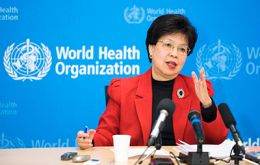MercoPress. South Atlantic News Agency
Tag: Margaret Chan
-
Tuesday, January 20th 2015 - 05:57 UTC
WHO calls for urgent action to reduce burden of non communicable diseases

Urgent government action is needed to meet global targets to reduce the burden of non-communicable diseases (NCDs), and prevent the annual toll of 16 million people dying prematurely—before the age of 70 – from heart and lung diseases, stroke, cancer and diabetes, according to a new World Health Organization report.
-
Monday, October 20th 2014 - 07:30 UTC
WHO admits full-scale battle with tobacco industry, which appeals to 'devious channels'

The sixth session of the Conference of the parties (COP6) to the WHO Framework Convention on Tobacco Control (FCTC) concluded in Moscow. Several landmark decisions were adopted in the course of the six-day session, regarded as one of the most successful in the WHO FCTC’s history.
-
Saturday, August 9th 2014 - 06:38 UTC
Ebola outbreak becomes a “public health emergency of international concern”

World Health Organization declared on Friday that the Ebola outbreak spreading across West Africa has become a “public health emergency of international concern”. WHO also revealed that Ebola took an additional 29 lives between Tuesday and Wednesday alone.
-
Tuesday, August 5th 2014 - 06:58 UTC
World Bank pledges 200 million dollars to combat the West Africa Ebola epidemic

With the latest death toll from the West Africa Ebola epidemic now at 887, the World Bank Group pledged on Monday as much as 200 million dollars in emergency funding to help Guinea, Liberia, and Sierra Leone contain the spread of Ebola infections, help their communities cope with the economic impact of the crisis, and improve public health systems throughout West Africa.
-
Saturday, August 2nd 2014 - 07:56 UTC
Ebola outbreak 'out of control' but 'can be stopped' said world's top health official

West Africa's Ebola outbreak is out of control but it can be stopped, World Health Organization chief Margaret Chan said on Friday at a meeting in Conakry, capital of Guinea.
-
Saturday, July 12th 2014 - 10:40 UTC
UN members pledge to combat avoidable non-communicable diseases and preventable deaths

UN Member States have reaffirmed their commitment to take bold measures to reduce the avoidable burden of non-communicable diseases. These ailments, including heart disease and stroke, cancer, diabetes and lung disease kill 38 million people every year, many of them before they reach the age of 70.
-
Thursday, May 29th 2014 - 02:45 UTC
WHO calls on countries to raise taxes on tobacco to prevent addiction

On World No Tobacco Day (31 May), WHO calls on countries to raise taxes on tobacco to encourage users to stop and prevent other people from becoming addicted to tobacco. Based on 2012 data, WHO estimates that increasing tobacco taxes by 50%, all countries would reduce the number of smokers by 49 million within the next three years and ultimately save 11 million lives.
-
Monday, May 19th 2014 - 21:00 UTC
WHO's Dr. Chan targets childhood obesity: “our children are getting fatter”

World Health Organization Director-General Dr. Margaret Chan voiced deep concern about the increase worldwide of childhood obesity, with numbers climbing fastest in developing countries. “As the 2014 World Health Statistics report bluntly states, ‘Our children are getting fatter,’” she said during her opening speech to the Health Assembly on Monday in Geneva.
-
Monday, May 19th 2014 - 13:54 UTC
People living longer, both in rich and poor countries, says latest WHO report

People everywhere are living longer, according to the World Health Statistics 2014 published this week by the World Health Organization (WHO). Based on global averages, a girl who was born in 2012 can expect to live to around 73 years, and a boy to the age of 68. This is six years longer than the average global life expectancy for a child born in 1990.
-
Friday, October 11th 2013 - 18:19 UTC
WHO calls for the phase out of mercury fever-thermometers by 2020

The World Health Organization (WHO) and Health Care without Harm organisation have joined forces to launch a new initiative to get mercury removed from all medical measuring devices by 2020.
